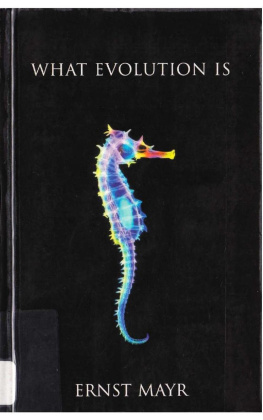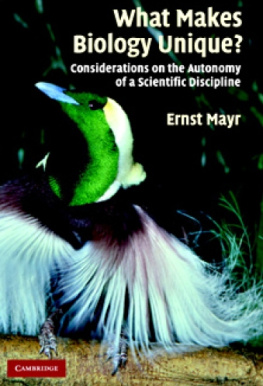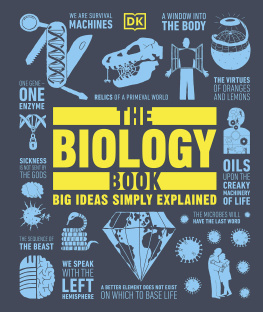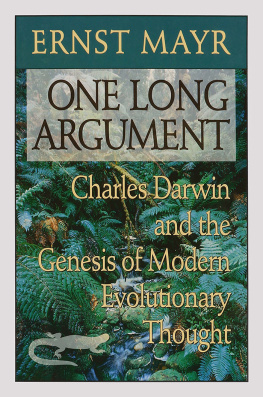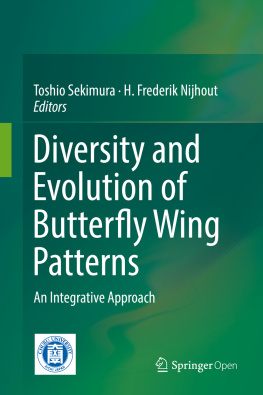The Belknap Press of Harvard University Press Cambridge, Massachusetts London, England
Copyright 1982 by Ernst Mayr All rights reserved Printed in the United States of America
Mayr, Ernst, 1904The growth of biological thought.
Bibliography: p. Includes index. 1. Biology -- History. 2. Biology -- Philosophy -- History. I. Title.
QH305.M26 574'.09 81-13204 ISBN 0-674-36445-7 (cloth) AACR2 ISBN 0-674-36446-5 (paper)
Preface
MUCH OF MODERN BIOLOGY, particularly the various controversies between different schools of thought, cannot be fully understood without a knowledge of the historical background of the problems. Whenever I made this point to my students, they would ask me in what book they could read up on these matters. To my embarrassment, I had to admit that none of the published volumes filled this need. To be sure, there is much literature on the lives of biologists and their discoveries, but these writings are invariably inadequate as far as an analysis of the major problems of biology are concerned or as a history of concepts and ideas in biology. While some of the histories of individual biological disciplines, like genetics and physiology, are indeed histories of ideas, there is nothing available that covers biology as a whole. To fill this gap in the literature is the object of this work. This volume is not, and this must be stressed, a history of biology, and it is not intended to displace existing histories of biology, such as that of Nordenskild. The emphasis is on the background and the development of the ideas dominating modern biology; in other words, it is a developmental, not a purely descriptive, history. Such a treatment justifies, indeed necessitates, the neglect of certain temporary developments in biology that left no impact on the subsequent history of ideas.
When I first conceived the plan to write a history of ideas in biology, the goal seemed impossibly remote. The first years ( 19701975) were devoted to reading, notetaking, and the preparation of a first draft. Soon it became obvious that the subject was too vast for a single volume, and I decided to prepare first a volume on the biology of "ultimate" (evolutionary) causations. But even this limited objective is a hopelessly vast undertaking. If I have been successful at all, it is because I have myself done a considerable amount of research in most areas covered by this volume. This means that I was already reasonably familiar with the problems and some of the literature of the areas involved. I hope to
-vii-
deal with the biology of "proximate" (functional) causations in a later volume that will cover physiology in all of its aspects, developmental biology, and neurobiology. When a biological discipline, for instance genetics, deals both with ultimate and proximate causations, only the ultimate causations are treated in the present volume. There are two areas of biology that might have been (at least in part) but were not included in this volume: the conceptual history of ecology and that of behavioral biology (particularly ethology). Fortunately, this omission will not be quite as painful as it might otherwise be, because several volumes by other authors dealing with the history of ecology and ethology are now in active preparation.
The professional historian is not likely to learn much from chapters 1 and 3; in fact he may consider them somewhat amateurish. I have added these two chapters for the benefit of nonhistorians, believing that it will help them to see the purely scientific developments of the other chapters with a deepened perception.
I owe an immense debt of gratitude to numerous individuals and institutions. Peter Ashlock, F. J. Ayala, John Beatty, Walter Bock, Robert Brandon, Arthur Cain, Fred Churchill, Bill Coleman, Lindley Darden, Max Delbrck, Michael Ghiselin, John Greene, Carl Gustav Hempel, Sandra Herbert, Jon Hodge, David Hull, David Layzer, E. B. Lewis, Robert Merton, J. A. Moore, Ron Munson, Edward Reed, Phillip Sloan, Frank Sulloway, Mary Williams, and others have read drafts of various chapters, have pointed out errors and omissions, and have made numerous constructive suggestions. I did not always follow their advice and am thus solely responsible for remaining errors and deficiencies. To P. Ax, Muriel Blaisdell, and B. Werner I am indebted for useful factual information.
Gillian Brown, Cheryl Burgdorf, Sally Loth, Agnes I. Martin, Maureen Sepkoski, and Charlotte Ward have typed innumerable drafts and helped with the bibliography. Walter Borawski not only typed preliminary versions but also the entire final copy of the manuscript and of the bibliography and prepared the manuscript of the index. Randy Bird contributed to filling gaps in the references. Susan Wallace edited the entire manuscript and in the process eliminated numerous inconsistencies, redundancies, and stylistic infelicities. All of these people materially contributed to the quality of the final product. It is obvious how great a debt of gratitude I owe to them.
-viii-
The Museum of Comparative Zoology, through the courtesy of its Director, Professor A. W. Crompton, has provided office space, secretarial help, and library facilities, even after my retirement. Research periods at the I nstitute for Advanced Study ( Princeton, spring 1970), at the library of the Max Planck Institute of Biology (Tfibingen, 1970), a senior fellowship of the Alexander von Humboldt Foundation (Wrzburg, 1977), a fellowship awarded by the Rockefeller Foundation (Villa Serbelloni, Bellagio, 1977), and a grant (No. GS 32176) by the National Science Foundation have greatly facilitated my work.
Whenever secretarial help was not available, my wife took over, transcribed dictations, excerpted literature, and aided the work on the manuscript in countless ways. It is impossible to acknowledge appropriately her inestimable contributions to this volume.
Ernst Mayr Museum of Comparative Zoology Harvard University
-ix-
Contents
| Introduction: How to write history of biology **1234567 |
| Why study the history of
biology? |
|
|
| The place of biology in the sciences and its conceptual structure |
| | | The position of biology within the sciences |
| | How and why is biology different? |
| | Special characteristics of living organisms |
| | | | The conceptual structure of biology |
| | A new philosophy of biology |
|
|
| The changing intellectual milieu of biology |
|


